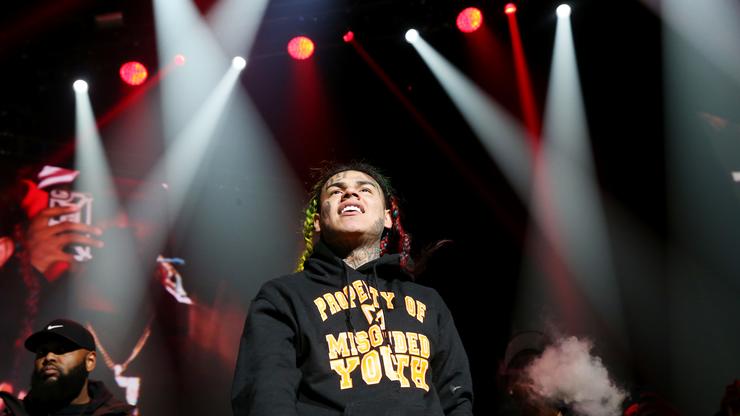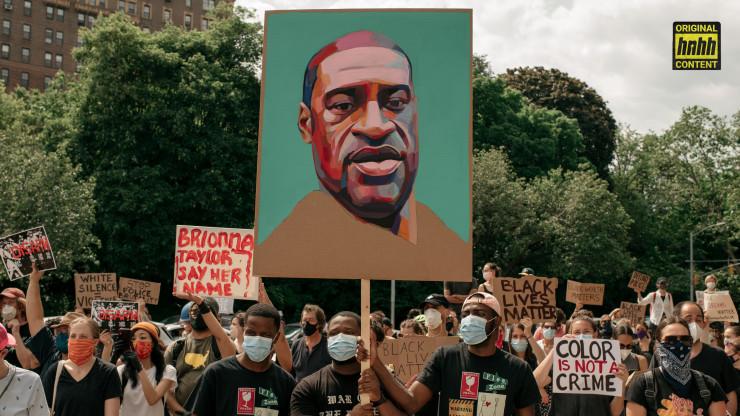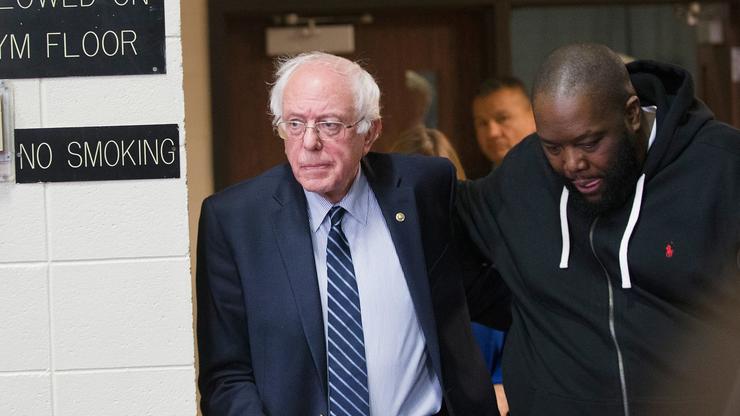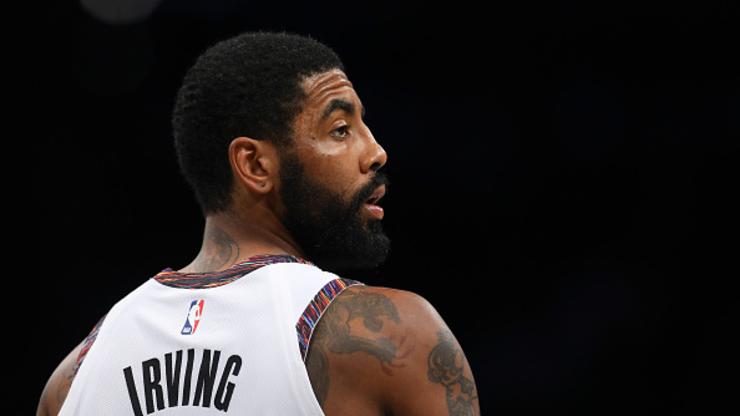With all of the social unrest going on in the United States right now, some of hip-hop's most prominent voices are speaking out. For instance, Kanye West joined protesters in Chicago while Meek Mill wrote a brand new song called "Otherside of America." Both of these particular artists are trying to do right by their communities and while they may be going about it in different ways, there is no denying that they are both equally impactful.
Well, Tekashi 6ix9ine doesn't seem to see it that way as today, he took aim at Meek Mill and his new song. On his Instagram story, 6ix9ine praised Kanye for being in the streets while disparaging Meek for dropping a track. 6ix9ine even went as so far as to call Meek a "Wanna Be MLK" which is definitely out of line.
Considering Tekashi's history, it doesn't seem fair at all for him to make such a statement. Not to mention, Meek has been working extremely hard to instill justice reform and make a difference for all of those who have been taken advantage of by the system. Meanwhile, Tekashi has done nothing except disparage every single artist that pops up in his head.
If you're Meek, all you can do is shake your head and move on.
We Need To Let Go Of Respectability Politics In The Fight For Black Liberation
To the Black community.
This week, while I was discussing different Black revolutionary texts with a friend in the midst of socio-political upheaval, she referenced an incredibly powerful Audre Lorde essay: “The master’s tools will never dismantle the master’s house,” (which you can read here). In the essay, Lorde explains that to bring about real, systemic change, we cannot work within the same racist institutions and systems built on these principals. As protests erupted in all 50 states this past weekend, and as celebrities chimed in on the dialogue, I think the Black community needs to be reminded of something.
With the amount of resistance being faced by Black Americans as they attempt to disrupt oppressive systems in the country, one would wonder what makes dismantling white supremacy so controversial. In this piece, I will explain why the Black community needs to let go of respectability politics to usher in a new era of Black liberation.
Martin Luther King Jr.’s legacy has long been misappropriated as a tool for respectability politics: the idea that marginalized groups need to behave in a ‘respectable way’ in order to receive better treatment from the group in power. This means that Black people need to talk right, act right, and dress right in order to avoid maltreatment from the white ruling class– ‘right’ meaning as closely aligned to whiteness as possible. Respectability politics are best illustrated when Black boys, or men, get murdered by law enforcement and people attempt to justify the killing by bringing up the way they dress, or maybe a history of smoking weed. The justification is that because this Black boy had on a hoodie and sagging pants, and because this Black boy smelled like weed, he therefore deserved it. Not all Black boys wear hoodies and sag their pants, and not all Black boys smoke weed, however, the point is, Black boys are policed as if these things equate to them being a criminal. George Zimmerman described Trayvon Martin as wearing a hoodie the night he killed the unarmed teenager, and claimed self-defense in fear for his life. The judge in the case also allowed evidence of Martin’s marijuana use to be used in the case, although this had absolutely nothing to do with Martin’s murder.

AUGUST 1963 – Dr. Martin Luther King Jr. addresses a crowd at the March On Washington D.C – CNP/Getty Images
The idea of respectability politics is that, if Black people act and conduct themselves in a “proper manner,” they can avoid being subjected to white violence. They can avoid being lynched, they can avoid being murdered by law enforcement, and black women, specifically, can avoid disproportionately dying in childbirth due to medical racism.
The appeal of respectability politics is understandable. There’s a desire to disarm and dismantle harmful stereotypes by instead exposing people to counter-stereotypic examples. If Black people are stereotyped as “poor,” “lazy,” and “thugs,” then exposing people to college-educated Black scholars or the Black elite who are actively disproving these stereotypes is rational. However, we need to finally recognize that respectability politics is nothing more than a coping mechanism that places the burden of change on marginalized communities. It also is not the answer in the fight for equality, systemic racism cannot be combated with “proper” behavior. Dr. King was still assassinated, regardless of how “respectable” he was.

1963: civil rights leaders, including Martin Luther King, Jr., protest with signs as they march on D.C. – Buyenlarge/Getty Images
Respectability politics has become so deeply internalized in the Black community that we’ve convinced ourselves we can avoid white hate by simply not acting in a way they would deem deplorable. As rapper Noname said, white supremacy is masterful because of the number of tools it employs for different oppressive systems. Respectability politics is no different. Our celebrities and Black elite are often agents of white supremacy by pushing the narrative of respectability politics, believing that members of the community can earn respect from white America by simply “acting right.”
Last week, Shameik Moore offered a thread to the black community on how to best “avoid” being killed by the police. Somehow, Shameik rationalized that we must work within our community to get the white ruling class to stop killing our people. “I refuse to have a slave mentality,” He said. “I don’t not fear for my life because I know how to carry myself in tuff situations.” Last Saturday, two Atlanta college students, Messiah Young and Taniyah Pilgrim, were surrounded by six officers who tased them and dragged them out of their car as they attempted to leave a protest after curfew. Young sustained a fractured arm and 24 stitches when he was pulled from the car. Excessive force was still used against Young and Pilgrim by law enforcement, despite their status as being college-educated. With the power of education, these students certainly do not have a “slave mentality,” yet were still brutalized by law enforcement.

MAY 1963 – A water cannon is used on Black children and teens, during a protest against segregation, organized by Martin Luther King Jr. and Reverend Fred Shuttlesworth, in Birmingham, Alabama – Frank Rockstroh/Michael Ochs Archives/Getty Images
Lil Wayne argued that when speaking about police brutality, you need to get specific. You can’t blame all white people or all cops. Wayne said, “And if we want to place the blame on anybody, it should be ourselves for not doing more than what we think we’re doing.” To Wayne, it’s solely the black community’s responsibility to do more, in order to avoid potential violent run-ins with law enforcement. Wayne does not believe there is a systemic problem in the criminal justice system, despite UN Human Rights appointed experts calling for the U.S. to reform their criminal justice system which has roots in slavery.

MAY 1963 – A Black woman fights with policemen during a protest against segregation in Birmingham, Alabama – Michael Ochs Archives/Getty Images
Killer Mike who comes from a family of police officers, pleaded with Atlanta citizens at a recent press conference, as they ravaged through their city to “stop burning down their own homes.” He said that now is not the time to riot, but instead to plan and organize, to vote for new officials, and to ensure the police officers involved in George Floyd’s murder are prosecuted. Prosecuting the officers involved will do little for systemic change in an institution founded on racism. The U.S. Drug Enforcement Agency (DEA) has recently been granted permission to investigate people protesting George Floyd’s death. Now, what does the DEA have to do with socio-political upheaval? Absolutely nothing.
“Drug enforcement” has long been used as a euphemism for racial profiling. The fact that the DEA is involved at all–the same government body that waged the War on Drugs which has had devastating long term impacts on the Black community– illustrates America’s institutional racism perfectly. Even with reform within the local criminal justice systems, there’s still a larger change within federal law enforcement that needs to happen in order to fully eradicate systemic oppression.
What all of these prominent figures in Black culture fail to realize is that white supremacy will not and cannot be dismantled with respectability politics. This narrative of respectability politics is dangerous. It does nothing to tackle the actual issue of white supremacy. Black people should not have to earn respect to be treated humanely. Black people should not have to conduct themselves in a specific manner to avoid being murdered at the hands of law enforcement. Respectability politics will not dismantle 200-year-old systems of white supremacy deeply entrenched in the very institution that is meant to protect us. If we attempt to use the same systems created to oppress us to achieve change, none of our efforts will be longstanding.
The blueprint for law enforcement in the United States originated from slave patrols in the nineteenth century. These slave patrols had three main priorities: “(1) to chase down, apprehend, and return to their owners, runaway slaves; (2) to provide a form of organized terror to deter slave revolts; and, (3) to maintain a form of discipline for slave-workers who were subject to summary justice, outside the law.” This organized terror was considered a civic duty, to subdue and oppress African Americans in the South as much as possible. Slave patrols also enforced curfews and worked to prevent any sort of organized resistance. Now, 200 years later, as American law enforcement patrol through American cities aggressively attempting to subdue protestors and enforce curfews, one would wonder what has truly changed since the era of slave patrols. The whole system of American policing was built on principles of white supremacy and it is past the point of reforming, simply prosecuting officers involved in George Floyd and Breonna Taylor’s murder is not enough. The master’s tools will never dismantle the master’s house.

1831: Slaves rebelling in Virginia during the revolt led by Nat Turner – MPI/Getty Images
Even now, as protests across the country turn into riots, respectability politics still echoes in many criticisms of protestors. A particular comment I came across regarding the rioting and looting in Minneapolis that ensued last week really struck me with the level of naivety and flawed thinking: “They were taking us serious before y’all started robbing Target.” Not only is this untrue, but it also places unrealistic expectations on Black rage. White people can trash a city and riot for no reason other than their sports team losing a game, which is precisely what happened in 2018 when the Philadelphia Eagles defeated the New England Patriots in the Super Bowl LII. Patriots fans in Philadelphia began to flip cars and light trash cans on fire in the streets. This happened again after the 2016 World Series, and again after the 2014 World Series. Yet, somehow, Black anger from centuries of systemic racism is inappropriate.
To the Black community, it is time to let go of respectability politics. As long as white supremacy persists, we will never completely earn that “respect,” no matter how close we assimilate to whiteness. The media paints protestors as violent and senseless rioters and looters with no purpose, but the truth is, Black people are fed up. As Malcolm X once said, “If you’re not careful the newspapers will have you hating the oppressed and loving the people who are doing the oppressing.” Black people have tried peaceful protesting. We have tried kneeling. We have tried raising awareness. We have tried respectability politics. And yet, they still keep killing us.

MAY 2020 – Police remove people from a vehicle during the George Floyd protest in Minneapolis, Minnesota – Scott Olson/Getty Images
Unfortunately, you can’t fight tear gas with roses and eucalyptus. You can’t and shouldn’t have to be peaceful in reaction to 200 years of white violence. As the president hides away in a bunker ready to wage war against his citizens, even he cannot deny that the revolution is upon us. And it is not meant to be pretty. It is time to dismantle the system.
I leave you with some Black liberation texts to explore if you want to understand how to achieve full liberation. New Reader has provided a collection of texts completely free of charge by prominent race scholars like Audre Lorde, bell hooks, James Baldwin, and Huey P. Newton. Here is the link. The answers are in the text.
Killer Mike Likens Bernie Sanders To Martin Luther King Jr. & Gets Slammed Online
Killer Mike further backed his statement.
Killer Mike has been advocating for Bernie Sanders for years now. The rapper is intelligent and well-spoken, but sometimes his statements miss the mark. That's what happened this past weekend when Killer Mike compared the struggles of Martin Luther King Jr. to those of Democratic presidential nominee hopeful Bernie Sanders. The entire debacle started when Killer Mike responded to a tweet by author and Hillary Clinton supporter Zachary Wood. Wood himself was responding to a tweet by Bernie where Mr. Sanders asked the youth to get out and vote. "There’s just something about you, @BernieSanders, that pisses me off," Wood wrote.
Once he saw Wood's response, Killer Mike hit back with a screenshot of an article titled, "Even Though He Is Revered Today, MLK Was Widely Disliked by the American Public When He Was Killed." Essentially, the rapper was comparing hatred for Sanders to the anger and animosity that MLK faced while he was alive. Mike continued on to write, "Your tweet better help. Me understand I’m on the correct side of history. Thank U." Killer Mike's response received many confused and angry replies.
Killer Mike responded in kind, claiming that he has been taught by those that worked with MLK, so his opinion rules supreme.
Kyrie Irving On Criticism He Receives: ‘They Crucified Martin Luther King, Too’
"They crucified Martin Luther King for speaking about peace and social integration."
Brooklyn Nets All Star point guard Kyrie Irving has made it clear that he thinks the team needs to add another piece or two in order to compete with the league's elite teams. Irving was criticized for telling reporters as much following last week's loss to the Philadelphia 76ers, but he is certainly used to the backlash.
During a lengthy interview with YES Network's Michael Grady, Irving spoke candidly about how he views those who speak negatively about him, all while referencing the immense scrutiny faced by Martin Luther King.
"When I was out for those seven weeks and not saying anything and still people are still saying things about me. It’s inevitable. They crucified Martin Luther King for speaking about peace and social integration. You can go back to historical leaders and great people in society that do great things, and they’re still going to talk shit about them. It is what it is."
Irving's comments came at the 2:40 mark in the video embedded below.
Irving's Nets are in action today as part of the NBA's annual slate of Martin Luther King Day games, but Irving himself won't be suiting up. According to head coach Kenny Atkinson, the 27-year old guard experienced tightness in his hamstring prior to tipoff and was subsequently pulled from the lineup.








